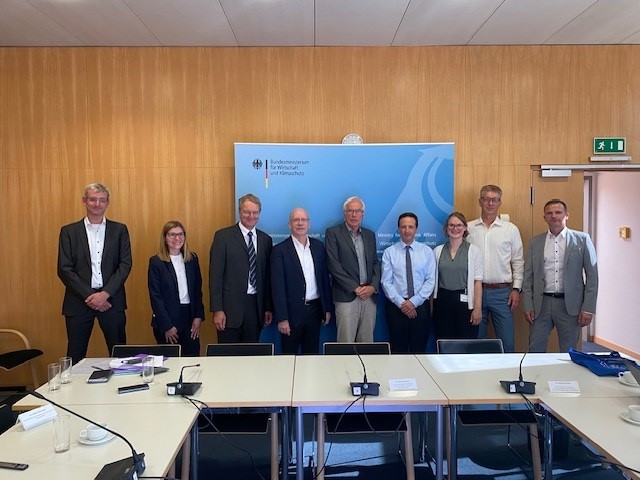Information event on government advisory Kosovo at Federal Ministry of Economic Affairs and Climate Action
On September 6th, 2023, the 22nd information event on government advisory Kosovo took place. As a hybrid event, participation was possible both in person at the premises of the Federal Ministry for Economic Affairs and Climate Action (BMWK), as well as online.

The event was moderated by Dr Norbert Schultes, who heads the International Administrative Partnerships Division at the ministry.
Matthias Conrad from the German Embassy in Pristina gave an overview of the political situation. It became clear that Kosovo has had some remarkable successes, which are also reflected in international indices. It is of vital importance to make a continuous effort to safeguard and enhance progress made, not least with regard to economic policy.
Overall, the economic development of the country can be considered relatively positive, as Dr. Ricardo Giucci, GET leader, pointed out in his subsequent presentation on the economic situation of the country. Due to the crisis, the country’s economy grew by only 3.5 percent in 2022, a very respectable value compared to most Western European countries. For the current year, a somewhat stronger growth of 3.8 percent is expected, which is mainly due to public consumption and the positive development in the tourism sector. Other macroeconomic indicators developed differently, with the crisis-related high inflation rate falling significantly this year and the traditionally high current account deficit stabilising at a high level, while the trade deficit is expected to widen further.
An important factor of economic development in Kosovo are service exports, especially tourism, which is also developing very dynamically this year, as well as remittances from the Kosovar diaspora, traditionally a strong pillar of the national economy, suggested Marie-Aimée Salopiata, GET project manager for Kosovo. A positive trend can also be seen in foreign direct investment, which has not only grown strongly in terms of quantity but is also increasingly reaching broader sectors of the economy, as Björn Vogler, investment- and development expert, pointed out.
Another key topic of the event was energy policy. As a signatory state of the Western Balkans Energy Community, Kosovo is developing a national energy and climate plan with ambitious goals. The German Economic Team has accompanied and supported this development.
We would like to thank the Federal Ministry for Economic Affairs and Climate Action for the organisation of the event and all participants for their valuable inputs.